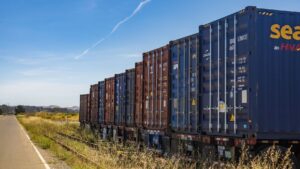
A political debate in Germany on whether investments should target the construction of freeways or railways has been taking place since 26 January. Parliament party FDP represented by the German federal transport minister Volker Wissing has been actively suggesting that road infrastructure building should be prioritised to make the country’s economy more attractive. “We have reached the low point where the Federal transport minister downgrades rail in favour of road”, says the German rail freight sector.
Four German rail freight associations teamed up against Wissing and his “fixation on new autobahns”. Allianz pro-Schiene, De Güterbahnen, GDL and VPI underlined that the current parliamentary discourse on promoting road infrastructure over rail (a position opposed by the Greens) is reaching the limits of becoming dangerous towards the pressing need to implement rail-oriented projects.
On top of that is conflicting, the initial promises of the German government elected in 2021 to invest “considerably more in the railways than in the roads”. The German rail industry has already criticised heavily the slow pace with which the federal government delivers its promises.
Facts speak for themselves
Apart from criticising the Federal transport minister for lobbying in favour of road investments, the four associations’ coalition stressed that facts could support the importance of rail freight transport in Germany.
For instance, Peter Westenberger, managing director of the association De Güterbahnen commented that “the performance and share of freight traffic are significantly higher than before Corona. From the current level of around 20 per cent, our companies believe that growth to 35 per cent by 2035 is possible if the federal government does its homework on the infrastructure and framework conditions”. “However, he continued, “the minister has not even looked at our proposals so far”.
GDL’s chairman Claus Weselsky said that he understands that the road’s superior capacity compared to rail seems attractive. However, this is not an excuse to invest more in road infrastructure. In contrast, he said, “all eyes should be on rail, and all resources must be used primarily by rail. Dirk Flege from Allianz pro-Schiene said that the solution is quite easy: “we have to speed up everything related to rail, and invest in roads only when it comes to renovating them”.